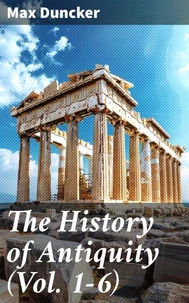The History of the Ancient Civilizations. Egypt, Assyria, Phoenicia, Israel, Babylon, Lydia, Arians, Buddhists and Brahmans, The Medes and Persians…
Par : ,Formats :
Disponible dans votre compte client Decitre ou Furet du Nord dès validation de votre commande. Le format ePub est :
- Compatible avec une lecture sur My Vivlio (smartphone, tablette, ordinateur)
- Compatible avec une lecture sur liseuses Vivlio
- Pour les liseuses autres que Vivlio, vous devez utiliser le logiciel Adobe Digital Edition. Non compatible avec la lecture sur les liseuses Kindle, Remarkable et Sony
 , qui est-ce ?
, qui est-ce ?Notre partenaire de plateforme de lecture numérique où vous retrouverez l'ensemble de vos ebooks gratuitement
Pour en savoir plus sur nos ebooks, consultez notre aide en ligne ici
- Nombre de pages2119
- FormatePub
- ISBN859-65--4778069-4
- EAN8596547780694
- Date de parution17/12/2023
- Protection num.Digital Watermarking
- Taille3 Mo
- Infos supplémentairesepub
- ÉditeurGOOD PRESS
Résumé
In "The History of the Ancient Civilizations, " Max Duncker offers a comprehensive exploration of the formative cultures that shaped human history. Through a meticulous synthesis of archaeological findings and historical narratives, Duncker delves into the intricate social, political, and economic frameworks of ancient societies, including Mesopotamia, Egypt, and the Indus Valley. His scholarly approach is characterized by a clear and engaging narrative style, making complex information accessible while maintaining rigorous academic standards.
Positioned within the 19th-century historiographical context, this work reflects a burgeoning interest in empirical research and the development of comparative history, situating ancient civilizations within a broader narrative of human achievement and progress. Max Duncker, a distinguished historian of his time, drew on his extensive studies across various disciplines, including archaeology, anthropology, and philology, to craft this seminal text.
His passion for understanding the interconnections between cultures and the evolution of societies likely influenced his comprehensive perspective. Duncker'Äôs commitment to academic rigor and the accessibility of historical inquiry paved the way for future scholars in the field. This book is highly recommended for both students and aficionados of history, offering invaluable insights into the complexities of ancient civilizations.
Duncker'Äôs engaging prose not only enlightens readers about the past but invites reflection on the enduring legacies of these foundational cultures in contemporary society.
Positioned within the 19th-century historiographical context, this work reflects a burgeoning interest in empirical research and the development of comparative history, situating ancient civilizations within a broader narrative of human achievement and progress. Max Duncker, a distinguished historian of his time, drew on his extensive studies across various disciplines, including archaeology, anthropology, and philology, to craft this seminal text.
His passion for understanding the interconnections between cultures and the evolution of societies likely influenced his comprehensive perspective. Duncker'Äôs commitment to academic rigor and the accessibility of historical inquiry paved the way for future scholars in the field. This book is highly recommended for both students and aficionados of history, offering invaluable insights into the complexities of ancient civilizations.
Duncker'Äôs engaging prose not only enlightens readers about the past but invites reflection on the enduring legacies of these foundational cultures in contemporary society.
In "The History of the Ancient Civilizations, " Max Duncker offers a comprehensive exploration of the formative cultures that shaped human history. Through a meticulous synthesis of archaeological findings and historical narratives, Duncker delves into the intricate social, political, and economic frameworks of ancient societies, including Mesopotamia, Egypt, and the Indus Valley. His scholarly approach is characterized by a clear and engaging narrative style, making complex information accessible while maintaining rigorous academic standards.
Positioned within the 19th-century historiographical context, this work reflects a burgeoning interest in empirical research and the development of comparative history, situating ancient civilizations within a broader narrative of human achievement and progress. Max Duncker, a distinguished historian of his time, drew on his extensive studies across various disciplines, including archaeology, anthropology, and philology, to craft this seminal text.
His passion for understanding the interconnections between cultures and the evolution of societies likely influenced his comprehensive perspective. Duncker'Äôs commitment to academic rigor and the accessibility of historical inquiry paved the way for future scholars in the field. This book is highly recommended for both students and aficionados of history, offering invaluable insights into the complexities of ancient civilizations.
Duncker'Äôs engaging prose not only enlightens readers about the past but invites reflection on the enduring legacies of these foundational cultures in contemporary society.
Positioned within the 19th-century historiographical context, this work reflects a burgeoning interest in empirical research and the development of comparative history, situating ancient civilizations within a broader narrative of human achievement and progress. Max Duncker, a distinguished historian of his time, drew on his extensive studies across various disciplines, including archaeology, anthropology, and philology, to craft this seminal text.
His passion for understanding the interconnections between cultures and the evolution of societies likely influenced his comprehensive perspective. Duncker'Äôs commitment to academic rigor and the accessibility of historical inquiry paved the way for future scholars in the field. This book is highly recommended for both students and aficionados of history, offering invaluable insights into the complexities of ancient civilizations.
Duncker'Äôs engaging prose not only enlightens readers about the past but invites reflection on the enduring legacies of these foundational cultures in contemporary society.



